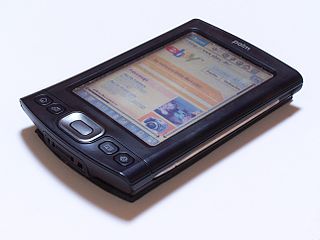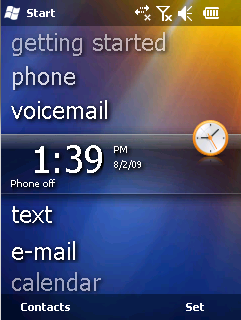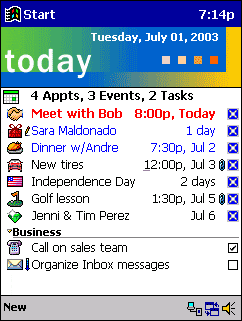
Adobe Flash is a discontinued multimedia software platform used for production of animations, rich internet applications, desktop applications, mobile apps, mobile games, and embedded web browser video players.

A personal digital assistant (PDA), also known as a handheld PC, is a multi-purpose mobile device which functions as a personal information manager. PDAs have been mostly displaced by the widespread adoption of highly capable smartphones, in particular those based on iOS and Android, and thus saw a rapid decline in use after 2007.

Palm OS was a mobile operating system initially developed by Palm, Inc., for personal digital assistants (PDAs) in 1996. Palm OS was designed for ease of use with a touchscreen-based graphical user interface. It was provided with a suite of basic applications for personal information management. Later versions of the OS were extended to support smartphones. The software appeared on the company's line of Palm devices while several other licensees have manufactured devices powered by Palm OS.
Java Platform, Micro Edition or Java ME is a computing platform for development and deployment of portable code for embedded and mobile devices. Java ME was formerly known as Java 2 Platform, Micro Edition or J2ME.

A Pocket PC is a class of personal digital assistant (PDA) that runs the Windows Mobile or Windows Embedded Compact operating system that has some of the abilities of modern desktop PCs. The name was introduced by Microsoft in 2000 as a rebranding of the Palm-size PC category. Some of these devices also had integrated phone and data capabilities, which were called Pocket PC Phone Edition. Windows "Smartphone" is another Windows CE based platform for non-touch flip phones or dumber phones.
In computing, cross-platform software is computer software that is designed to work in several computing platforms. Some cross-platform software requires a separate build for each platform, but some can be directly run on any platform without special preparation, being written in an interpreted language or compiled to portable bytecode for which the interpreters or run-time packages are common or standard components of all supported platforms.
Windows Embedded Compact, formerly Windows Embedded CE, Windows Powered and Windows CE, is a discontinued operating system developed by Microsoft for mobile and embedded devices. It was part of the Windows Embedded family and served as the foundation of several classes of devices including the Handheld PC, Pocket PC, Auto PC, Windows Mobile, Windows Phone 7 and others.
Qt Extended is an application platform for embedded Linux-based mobile computing devices such as personal digital assistants, video projectors and mobile phones. It was initially developed by The Qt Company, at the time known as Qt Software and a subsidiary of Nokia. When they cancelled the project the free software portion of it was forked by the community and given the name Qt Extended Improved. The QtMoko Debian-based distribution is the natural successor to these projects as continued by the efforts of the Openmoko community.

The Tapwave Zodiac is a mobile entertainment console. Tapwave announced the system in May 2003 and began shipping in October of that same year. The Zodiac was designed to be a high-performance mobile entertainment system centered on video games, music, photos, and video for 18- to 34-year-old gamers and technology enthusiasts. By running an enhanced version of the Palm Operating System (5.2T), Zodiac also provided access to Palm's personal information management software and many other applications from the Palm developer community. The company was based in Mountain View, California.

A mobile game is a video game that is typically played on a mobile phone. The term also refers to all games that are played on any portable device, including from mobile phone, tablet, PDA to handheld game console, portable media player or graphing calculator, with and without network availability. The earliest known game on a mobile phone was a Tetris variant on the Hagenuk MT-2000 device from 1994.

Windows Mobile is a discontinued mobile operating system developed by Microsoft for smartphones and personal digital assistants.
Robinson Technologies is a Japanese video game developer founded by Seth Robinson. The company produced the BBS door games Legend of the Red Dragon, Planets: The Exploration of Space and Growtopia, an experimental multiplayer creative sandbox created as a collaboration with Hamumu Software, released in 2013 for iOS, Android, Microsoft Windows, and macOS.

Windows Mobile 2003, originally codenamed "Ozone", was a member of the Windows Mobile family of mobile operating systems, released on June 23, 2003. It was the first Microsoft mobile OS to be called "Windows Mobile" and was based on Windows CE 4.20.
The following is a comparison of e-book formats used to create and publish e-books.
A mobile operating system is an operating system used for smartphones, tablets, smartwatches, smartglasses, or other non-laptop personal mobile computing devices. While computers such as typical/mobile laptops are "mobile", the operating systems used on them are generally not considered mobile, as they were originally designed for desktop computers that historically did not have or need specific mobile features. This line distinguishing mobile and other forms has become blurred in recent years, due to the fact that newer devices have become smaller and more mobile unlike hardware of the past. Key notabilities blurring this line are the introduction of tablet computers, light-weight laptops, and the hybridization of the two in 2-in-1 PCs.

Resco spol. s r.o. is an IT company with headquarters in Bratislava, Slovakia that was founded in 1999 by Radomir Vozar, Eduard Kirchner and Marcel Saffa. As of 2014 the company has grown its customer base up to more than million users and 4000 corporations. Resco stands for REmote Solutions COmpany.
Microsoft mobile services are a set of proprietary mobile services created specifically for mobile devices; they are typically offered through mobile applications and mobile browser for Windows Phone platforms, BREW, and Java. Microsoft's mobile services are typically connected with a Microsoft account and often come preinstalled on Microsoft's own mobile operating systems while they are offered via various means for other platforms. Microsoft started to develop for mobile computing platforms with the launch of Windows CE in 1996 and later added Microsoft's Pocket Office suite to their Handheld PC line of PDAs in April 2000. From December 2014 to June 2015, Microsoft made a number of corporate acquisitions, buying several of the top applications listed in Google Play and the App Store including Acompli, Sunrise Calendar, Datazen, Wunderlist, Echo Notification Lockscreen, and MileIQ.

FBReader is an e-book reader for Linux, Microsoft Windows, Android, and other platforms.

Pocket PC 2000 was the first member of the Windows Mobile family of mobile operating systems that was released on April 19, 2000, and was based on Windows CE 3.0. It is the successor to the operating system aboard Palm-size PCs. Backwards compatibility was retained with such Palm-size PC applications.








